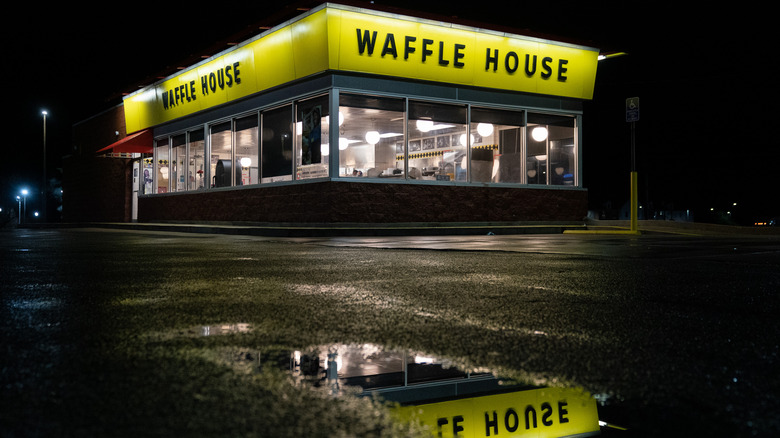Waffle House Workers Have Gone On Strike In South Carolina Over Safety Concerns
While the Waffle House Index measures the company's response during a natural disaster, another pending crisis is impacting workers in South Carolina. After a list of demands went unanswered by management, five South Carolina Waffle House employees supported by labor organizers went on a three-day strike. In a statement to Nation's Restaurant News, Waffle House said that it would be addressing the associates' concerns directly with them.
The Post and Courier reported that the employees' demands included, "fair and consistent scheduling, sufficient security for each shift, higher pay and repairing of equipment." While each area has specific concerns, overall worker security united the issues.
The striking location on Garners Ferry Road is located in a high crime area. Although the restaurant employs a security guard on select shifts, the staff has had to deal with unruly customers and have been threatened, as told to The Post and Courier. From having cups of sugar and salt thrown at them to alleged assault with a knife, the employees are fearful of their work environment.
In addition to customer threats, workers are asking for store repairs to alleviate an unhealthy work environment. Inoperable air conditioning has led to some employees having heat related health issues. Whether or not the three-day strike will implore Waffle House to make inroads on the workers' demands remains to be seen. For now, the employees hope that a little public heat will implement meaningful change.
Waffle House workers discuss unfair working condition that led to a strike
Working in the food industry is not always an easy path. Long hours, difficult customers, and lower wages can be frustrating for workers. At one South Carolina Waffle House location, the conditions became so difficult it led to a strike.
Outside of the restaurant, the Waffle House employees chanted, "treat your employees like you should." One employee raised concern over mandatory meal deduction to her salary regardless of eating an employee meal. Some employees said that understaffing creates a scenario without a meal break, yet the salary reduction is not adjusted. When being paid a minimal wage, those deductions can be substantial. As Naomi Harris, a waitress at the location told The Post and Courier, "we are working for scraps and pennies." Some employees seek additional governmental assistance for groceries.
While wage issues are part of the demands, employees have many stories regarding an unsafe work environment. Although poor customer behavior might be on the rise, no one should face potential life-threatening action. Workers have called the police when they have faced alleged assault and battery by disgruntled customers. Summer Schoolmeester-Cochran, who works late night shifts said, "I've been threatened to be pulled across the counter over a wrong order."
With the support from Union of Southern Service Workers, the employees hope that change will be on the agenda. But, as other food industry unions are learning, change is not as quick as cooking an order of scattered, smothered, and covered hash browns.

